
PUMPA - SMART LEARNING
எங்கள் ஆசிரியர்களுடன் 1-ஆன்-1 ஆலோசனை நேரத்தைப் பெறுங்கள். டாப்பர் ஆவதற்கு நாங்கள் பயிற்சி அளிப்போம்
Book Free DemoThe story "A Bicycle in Good Repair" is written by Jerome. k. Jerome. It opens with the narrator introducing the second, and probably the central, character of the story.
The narrator introduces the character as an acquaintance rather than as his friend. He introduces him as "a man I knew" instead of "a friend of mine", or as "one of my friends". This is crucial because it establishes the relationship between the narrator and the man.
One evening, the narrator and the man had made plans. The decision was to go on a bicycle ride the next day. The narrator made an effort to get ready on time. He woke up early, got ready, and waited for the man with his bicycle in his garden. However, the man came half an hour late.
The narrator introduces the character as an acquaintance rather than as his friend. He introduces him as "a man I knew" instead of "a friend of mine", or as "one of my friends". This is crucial because it establishes the relationship between the narrator and the man.
One evening, the narrator and the man had made plans. The decision was to go on a bicycle ride the next day. The narrator made an effort to get ready on time. He woke up early, got ready, and waited for the man with his bicycle in his garden. However, the man came half an hour late.

The narrator and the man had made plans to go on a bicycle ride
Soon after reaching the narrator's place, the man spoke to the narrator about the bicycle. He said that the bicycle looked great. He asked the narrator how it runs.
The narrator replies humorously. He says that the bicycle runs easily in the morning but becomes stiff in the afternoon.
The sentence spoken by the narrator might have various undertones. The explicit meaning is that the bicycle may become stiff after being used all morning. On the other hand, the narrator may be referring to the condition of humans rather than the machine. Humans have the tendency to feel lazy and tired post-lunch. The sentence can also mean that the narrator is indirectly telling the man that the man has arrived late and that it is high time that they began their journey since both the cycle and the humans may feel stiff after lunch.
The man decides to give it a look. He holds the bicycle at the front wheel and fork. Then he shakes it violently. This upsets the narrator. He tries to stop the man through feeble protests.
The narrator replies humorously. He says that the bicycle runs easily in the morning but becomes stiff in the afternoon.
The sentence spoken by the narrator might have various undertones. The explicit meaning is that the bicycle may become stiff after being used all morning. On the other hand, the narrator may be referring to the condition of humans rather than the machine. Humans have the tendency to feel lazy and tired post-lunch. The sentence can also mean that the narrator is indirectly telling the man that the man has arrived late and that it is high time that they began their journey since both the cycle and the humans may feel stiff after lunch.
The man decides to give it a look. He holds the bicycle at the front wheel and fork. Then he shakes it violently. This upsets the narrator. He tries to stop the man through feeble protests.
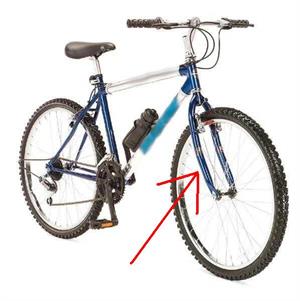
Bicycle fork
Later, the man declares that the front wheel of the bicycle wobbles.
The narrator was obviously unhappy with the man's behaviour. He defended his bicycle by saying that it was perfectly healthy. He said that the wheel was shaking only because the man kept shaking it. But the man was prepared to ignore the narrator's feeble protests. He said that it is dangerous to ride a bicycle that wobbles and asked the narrator if he has got a hammer with him. The man was determined to fix the issue.
Although the narrator was worried about his bicycle, he thought that the man knew what he was doing. Hence, he decided to bring the man the tools he needed from his tool shed.
Although the narrator was worried about his bicycle, he thought that the man knew what he was doing. Hence, he decided to bring the man the tools he needed from his tool shed.
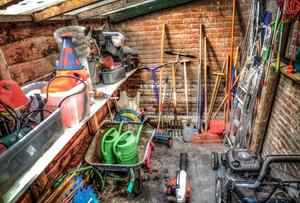
Tool shed
When the narrator came back with the tools, he was shocked to find the cycle in pieces. The man was sitting on the ground playing with the front wheel. It was held between his legs. The rest of the bicycle was lying on the path.
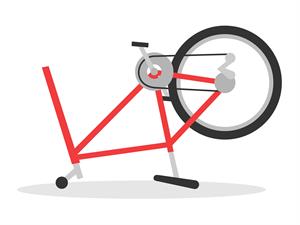
The front wheel was pulled out from the cycle
The narrator was worried about his bicycle. But he was a meek person, and hence he tried to dissuade the man gently. He asked the man not to trouble himself with the cycle any more because he would become tired. The narrator suggested that they should put it back and start their journey.
The man, on the other hand, thought that they should delve more into the problem, and proceeded with unfastening more screws and bearings. All of a sudden, several balls came undone and rolled all over the path. Then, the men crawled on fours and started looking for them. After spending about half an hour, they were able to find about sixteen.
The man hoped that they found all the missing balls, as he believed that it might cause a big difference with the machine. Of course, the humour is hard to miss in this sentence. We see the man talking about the serious difference the missing balls would cause when, in reality, he had effortlessly dissected the bicycle into pieces. What more can the little balls do that the man hasn't done himself?
Listening to the man's warning, the narrator did something extremely ridiculous with the balls. He put them in his hat for safety, fearing that he might lose them.
The man, on the other hand, thought that they should delve more into the problem, and proceeded with unfastening more screws and bearings. All of a sudden, several balls came undone and rolled all over the path. Then, the men crawled on fours and started looking for them. After spending about half an hour, they were able to find about sixteen.
The man hoped that they found all the missing balls, as he believed that it might cause a big difference with the machine. Of course, the humour is hard to miss in this sentence. We see the man talking about the serious difference the missing balls would cause when, in reality, he had effortlessly dissected the bicycle into pieces. What more can the little balls do that the man hasn't done himself?
Listening to the man's warning, the narrator did something extremely ridiculous with the balls. He put them in his hat for safety, fearing that he might lose them.

Ball bearings
The man suggested that he should look at the chain. He started to remove the gear-case. The narrator tried to discourage him again but to no avail. He told the man what one his friends had said about the gear-case. “If anything goes wrong with your gear-case, sell the machine and buy a new one; it comes cheaper.” The narrator was trying to tell him that the gear-case is quite expensive and that he should leave the gear-case alone.
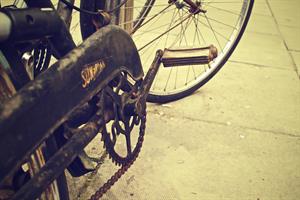
The man said that he should remove the gear-case
However, the man never listened to the narrator. He went on with his repair work. He said that people usually leave the gear-case alone because they are incapable of understanding how the machine works. His friend probably said that because he never knew anything about machines.
But things are different for the man, or so thinks he. He said that he finds it easier to remove the gear-case than anything else. Of course, the narrator never spoke anything about the difficulties in removing the gear-case, only the (monetary) difficulties in getting it replaced.
What the man claimed had indeed turned out to be true. In less than five minutes, and before the narrator could dissuade him, the man had the gear-case in two pieces. Moreover, to make matters worse, he lost the screws. Once again, he then started crawling over the garden, and this time to look for the missing screws. He said he found it a mystery when the screws kept disappearing.
The narrator knew that it was high time that he had stopped the man. Common sense told him that he has to put a full stop to the repair work before the man destroyed the cycle beyond repair. As it is, the cycle was in two pieces, and the narrator doesn't want to see things getting worse.
The inner voice asked him to take the man by the back of the neck and kick him out of the gate. He was a mad man, and the narrator had all the rights to protect his property and belongings.
The narrator knew that it was high time that he had stopped the man. Common sense told him that he has to put a full stop to the repair work before the man destroyed the cycle beyond repair. As it is, the cycle was in two pieces, and the narrator doesn't want to see things getting worse.
The inner voice asked him to take the man by the back of the neck and kick him out of the gate. He was a mad man, and the narrator had all the rights to protect his property and belongings.
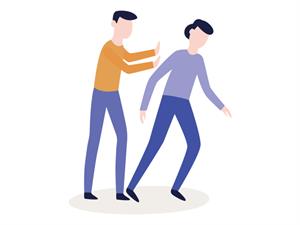
The narrator's common sense asked him to push the man out
But as evident from the narrator's inactions, he is a soft-spoken person and is constantly worried about hurting people's feelings.
But as evident from the narrator's inactions, he is a soft-spoken person and is constantly worried about hurting people's feelings.
Hence, he let the man mess with his bicycle.
Eventually, the man became tired of looking for the screws. Of course, he can't leave the screws without an excuse. So, he told the narrator that screws will turn up when they are least expected. So, he decided to take a look into the condition of the chain for a change. Although it was in a decent condition, the man wasn't happy with it. He meddled with the chain until it became too tight and stopped moving. Then he tinkered further and made it twice as loose as it was before.
Once he was done with the chain, the man decided to put the front wheel back to its place. The narrator held the fork open while the man struggled with the wheel. He kept fidgeting with it for about ten minutes. Since nothing fruitful came out of the man's struggles, the narrator suggested that they should change positions.

The man tries to put the front wheel back in its place
Finally, after a lot of effort, they managed to hold the wheel in the desired position.
The moment the wheel was in position, the man burst out laughing. The narrator couldn't figure out the joke in the situation, and asked him why he was laughing.
The man responds by calling himself an ass. The narrator couldn't agree more. He felt that it was the only sensible thing uttered by him since his arrival. He asked him what had made him say so.
It so happened that the men had forgotten all about the little balls. They are supposed to fix the wheel using those balls. The narrator quickly looked for his hat, for he had left the ball bearings in it for safekeeping. Unfortunately, he had dropped his hat (along with the balls) while he was trying to position the wheel.

The man laughed because he forgot about all the ball
In the end, the man suggested in a cheerful manner that they should put back the balls they could find and leave the rest to the fate.
After looking for the missing balls, the men were able to find about eleven of them. They fixed six of them on one side and the rest on the other side. It took about half an hour for them to get the wheel in its place. Unfortunately, the wheel that never wobbled earlier had started to wobble then. But the man didn't seem to be affected with newly-found wobbling. He said it was fine and could be managed for the time being.
The narrator commented on the cheerful manner of the man. He said that the man's confidence and hopefulness even during times when it is least called for fascinates him. While the narrator had no intention to bring in a sarcasm here, it is evident to the readers that the man's action and the narrator's reaction deserved to be mocked at. However, the narrator is a kind person, and he knows not how to mock a person.
The narrator commented on the cheerful manner of the man. He said that the man's confidence and hopefulness even during times when it is least called for fascinates him. While the narrator had no intention to bring in a sarcasm here, it is evident to the readers that the man's action and the narrator's reaction deserved to be mocked at. However, the narrator is a kind person, and he knows not how to mock a person.
The narrator's words encouraged the man to work on the gear-case. He sat at his work with a renewed energy. He picked the bicycle and positioned it against the wall of the house so that he could work on the right side of the bicycle.
Later, he put the cycle against a tree and worked on its right side. After a while, the man asked the narrator to hold the bicycle so that he could work from below. He lied on the ground and put his head between the wheels. While working, he dropped oil upon himself.
When none of the postures worked, the man took the cycle from the narrator and decided to fix it all by himself. He positioned the cycle against himself and bent over the other side of the cycle. Unfortunately, he lost his balance, tripped over, rolled on his head, and reached the other side of the cycle.
The fall caused the man to lose his temper. He was upset with the bicycle and decided to bully it. Since clumsiness was a part of the man's nature, his bullying started backfiring. In the name of fighting with the bicycle, he ended up hurting himself.
There was a tug-of-war between the man and the bicycle. One moment the bicycle would be on top of him, and later he would be on top of it.
There came a time when he thought that he had won, but soon he would fall or get hit by one of the handles.
This continued for a while. At 12:45 pm, the man decided to give up. He looked exhausted and dirty and had bruises from the scuffle. The bicycle also seemed quite worn out. Since both had their shares in the recent misfortune, it was hard to find out who had received most punishment.
There was a tug-of-war between the man and the bicycle. One moment the bicycle would be on top of him, and later he would be on top of it.
There came a time when he thought that he had won, but soon he would fall or get hit by one of the handles.
This continued for a while. At 12:45 pm, the man decided to give up. He looked exhausted and dirty and had bruises from the scuffle. The bicycle also seemed quite worn out. Since both had their shares in the recent misfortune, it was hard to find out who had received most punishment.
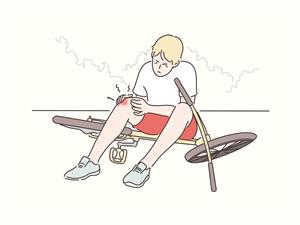
The man had cuts and bruises
Later, the narrator took the man into the back kitchen, and the man cleaned himself as much as he could.
At last, the man left for his home with their arrangement misfired. The bicycle, on the other hand, suffered at the wrong hands. It had turned almost useless and had possibly become quite dangerous to ride.

Finally, the man leaves home without going on the bicycle ride
Reference:
pc: https://commons.wikimedia.org/wiki/File:Bikefork.jpg